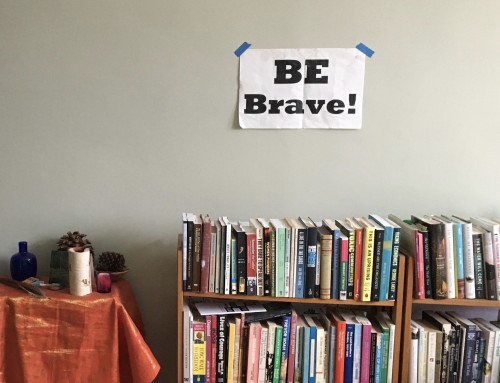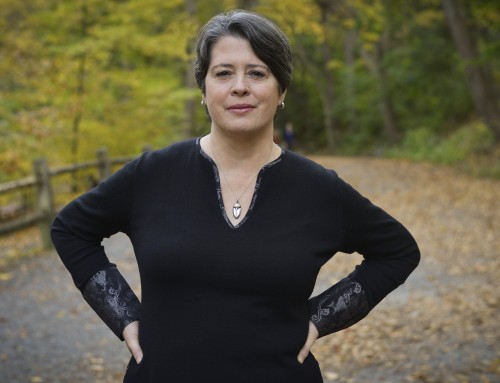Many years ago I was in the Peace Corps in Botswana, where most people speak Setswana, which I learned better than most Whites, but not fluently. Because I spoke some Setswana, people sometimes assumed that I knew more than I actually did. I remember once when I stopped by the shop near my little round house. One of the women behind the counter told me something in Setswana, and I had to answer, “Ga ke utlwe”—I don’t understand. The woman repeated herself, more loudly this time, but my response was the same. This went on until I felt she was shouting at me, and we were both frustrated. I finally left the store, still not knowing what seemed so urgent to the disappointed woman.
The problem was that Setswana uses the word utlwa to mean both “understand” and “hear.” I could hear the woman fine; I just had no idea what she was talking about. I think Quakers sometimes have a similar problem with language (and maybe not just Quakers). When we talk about hearing each other and feeling heard, we usually mean something other than the literal hearing that can be amplified by a computerized devise in the ear. We do need to speak up, to be mindful of those older Friends in the back benches who have no chance of understanding us if we don’t project a bit more, but that’s not the kind of hearing I’m concerned with here. This morning I’m thinking about how we can better hear with the heart and how we can speak in ways that make us more likely to be heard in that deeper way.
In English we are blessed with a number of words with different connotations. We can listen but not hear, hear but not understand, understand but not agree, or agree but not comply. Hearing with the heart is harder to define. It doesn’t necessarily mean agreeing with someone or doing what they want, though it does imply a deep understanding, empathy, and respect. Sometimes when people complain that they haven’t been heard, I sense they are just frustrated that they haven’t gotten their way yet, but more often I think it is because they haven’t yet felt the respect and empathy of their listeners. In my experience, once I feel truly heard—understood, respected, and empathized with—it is easier for me to stop repeating myself, which of course makes it easier to hear what the other person is saying.
I first started thinking about these multiple meanings of the word “hear” when I was living at Pendle Hill fifteen years ago. There were some earnest community members who felt they were “not being heard” on issues of gender equality, so—like the woman in Botswana—they simply kept repeating themselves more vehemently. In the end, some people who hadn’t thought deeply about gender concerns really did hear the pain in their voices, and some wonderful healing and growth took place in pockets of the community. In other parts of the community, however, there was no real understanding. There were many people who were glad at the end of the year to part company with the folks they were tired of listening to. I’m thinking about this experience now as our meeting community is engaged in some difficult discernment. After eight years of threshing sessions, discussions, meetings for worship for business, personal conversations, and called meetings for worship, I have the sense that we still have not totally heard each other. It’s all a bit exhausting, but unlike Pendle Hill, we are not a community that has near fifty per cent turn over at the end of every year. We can’t just wait this out.
I don’t have any solutions, but in Quaker tradition I have some queries, for our meeting members and for others who face similar situations:
Have I spoken my truth as clearly and honestly as I can, trusting that mine is just a piece of a greater Truth?
Have I felt understood and respected by my listeners?
If not, am I called to repeat my message, express it differently, or let it go?
Have I listened deeply to each person in my community, trusting that each holds a piece of a greater Truth?
Have I understood the concerns of each speaker and empathized with them?
If not, why not?
Have I spoken about anyone in my community in ways that disparage their perspective, perhaps making it more difficult for others to hear them with respect?
Have I done my best to help ground the community in the kind of deep speaking and listening that brings us all closer to God?
(For those who are unfamiliar with the Quaker use of queries, these are questions asked not to provoke an immediate or logial answer but to prompt us to examine the issues and our response to them more deeply. Friends often read queries at the beginning of a meeting and then sit in silence and let the questions work in us.)




Thank you, Friend. Your post is very apt for the condition of my Meeting as well; I hope you don’t mind if I pass it on to other members?
You are welcome, Tania. I am happy for you to pass it on.
Thanks! I’ve passed it on to my Worship & Ministry committee members.
Eileen,
I grew up in Botswana, and it was moving to me to read your story and encounter some Setswana again. On the “being heard” topic, while I think it is important to hear another person on their own terms and to avoid offedngin, I also worry sometimes that we liberal Quakers have made an idol of avoiding hurt feelings. As we seek to grow closer to God, there will inevitably be “convicting” experiences, and sometimes another human being will be a vehicle of that convicting, just as other humans sometimes are vehicles of grace. I think we do well to seek Truth, and to accept that Truth sometimes will be uncomfortable. I’m not arguing that we should ever justify causing discomfort or pain to another person. But I am suggesting that as part of our own spiritual practice, we accept that some pain and injustice is inevitable and then try to seek the Truth when we are hurt, rather than focus on the injustice done to us.
Susanne K
I am new to your blog, and new to the notions of Quakerism, but your writings have moved me and I intend to return. Thank you. AmyBeth
Welcome Suzanne and AmyBeth. Please visit again.
Eileen,
Like you, I have considered a variety of elements around being heard, listening, etc.
Over the past month, I have begun wondering if Friends could benefit from having a training in active listening or in http://www.cnvc.org/nvc.htm“ REL=”nofollow”>compassionate/non-violent communication.
I believe we do so-so with the action of listening deeply to one another–and I also believe that when we skip the somewhat mechanical step of saying back to the person some of what was already shared, we unintentionally take away the opportunity for the person to be “heard into a greater fullness.”
For example, if I say, “I’m really concerned about what’s going on with my relationship right now,” and I’m met with head-nods and “mm-hmms” that show folks are listening, I might stop right there. I may feeeeel heard, but I can go deeper into myself and into what is going on beneath my initial pass when someone reflects back to me what I’ve said, and invites me to say more:
“So you’re really worried about things… Can you say more about what’s going on with your relationship right now that has you worried?”
I think for me, the difference is that the second scenario shows me that the person truly has time and has made a personal commitment to hear me out fully.
Blessings,
Liz Opp, http://thegoodraisedup.blogspot.com“ REL=”nofollow”>The Good Raised Up
Thanks, Liz. That is a helpful point. Especially in business meeting there is a tendendy to not want to linger on the difficult point.